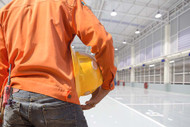In the dynamic landscape of modern factories, there is heavy machinery, foot traffic, and potential hazards, prioritising workplace safety. There is no negation of workplace safety. It is one of the integral components of maintaining a safe working environment, especially on the floor. Epoxy flooring has unique properties that customise the features and enhance workplace safety in factories.
In this article, we will explore the epoxy floor features that foster workplace safety in factories and allow maximum protection for the workers.
1: Slip Resistance for Accident Prevention
Epoxy flooring is slip-resistant, and the essential layer of protection actually protects the worker from slips and falls. In a factory setting, spills, oil, and other liquids are very common. The ability of epoxy, i.e., slip resistance, particularly in high-foot traffic and near machinery, reduces accidents, injuries, and falls. This navigates workplace safety protection.
2: Impact Resistance in High Traffic Zones
Factories are hubs of activity. Heavy machinery with labour constantly moves around and makes a high impact on the floor, due to which wear and tear occurs. Epoxy flooring in factories is known for its exceptional impact that shields against the daily wear and tear of heavy traffic. Minimising surface damage and deterioration enhances the overall safety of factories, leading to an increase in the value of reliable epoxy flooring.
3: Chemical resistance
Factories that are related to the product or chemicals are prone to harmful and hazardous effects on the workforce. The potential safety risks in such highly chemical or hazardous areas demand protection for labour. The factory floor made from epoxy has an underlying tendency to reduce the harmful effects of chemicals and ensure the longevity of the floor. The epoxy floor mitigates the risks associated with spills and exposure to chemicals.
4: Defining Zones and Walkways
Epoxy floors are made with transparent liquid, and they are used to create or define walkways or work zones very effectively. In factories, allocating the work zone and walkways leads to safety marking. Using the different colours, patterns, and even signs to make the epoxy surface for the visitors and guiding employees. Defining zones and walkways in the factories ensures safety and less confusion in the zones, ensuring established safety protocols within the factory.
5: Customised Safety Features
Epoxy flooring is highly customisable, allowing the business to incorporate specific safety features to meet the unique criteria of the factory. Some factories demand electronic equipment, so anti-static or ESD (Electrostatic Dissipative) epoxy is used on the floor to keep electric shocks to a minimum. In the same way, some factories demand chemical-resistant floors. Sensitive machinery to static electricity build-ups is protected from the required epoxy floor.
6: Ease of Cleaning and Maintenance
Epoxy flooring is non-porous and seamless, which makes it easy to clean and maintain. A clean workspace is vital for safety, as it reduces the risk of accidents caused by debris or spills. Regular maintenance of epoxy floors also ensures that any potential hazards, such as cracks or surface imperfections, are promptly addressed, further enhancing the safety of the environment.
7: Thermal Resistance
Many epoxy flooring formulations can withstand high temperatures, making them suitable for factories that deal with heat-generating processes. This thermal resistance helps prevent the flooring from degrading or becoming hazardous under extreme conditions, ensuring a safer working environment for employees.
8: UV Resistance
Certain types of epoxy flooring are designed to resist ultraviolet (UV) light, preventing fading and deterioration from sun exposure. This feature is particularly beneficial in factories with large windows or skylights, as it maintains the integrity of the flooring over time, reducing the risk of accidents caused by surface degradation.
9: Noise Reduction
Epoxy flooring can help in reducing noise levels in a factory setting. A quieter environment contributes to a safer workspace by improving communication and reducing the likelihood of accidents caused by misunderstandings or lack of awareness due to excessive noise.
10: Fire Resistance
Some epoxy flooring products are formulated to be fire-resistant, adding an additional layer of safety in factories that use flammable materials. This feature can help prevent the spread of flames in the event of a fire, providing more time for evacuation and response.
Conclusion
Epoxy floors in the factories are made to meet the specific safety standards and regulations up-to-date. The workplace requires employees to have a safe environment and versatile solutions to keep business running and adhere to the highest safety standards. Epoxy flooring goes beyond the appeal to make things possible for business owners and keep workplace safety compliance in mind. The impact of such installation and customisation operations leads to a better safety environment and fosters a secure industrial environment.

